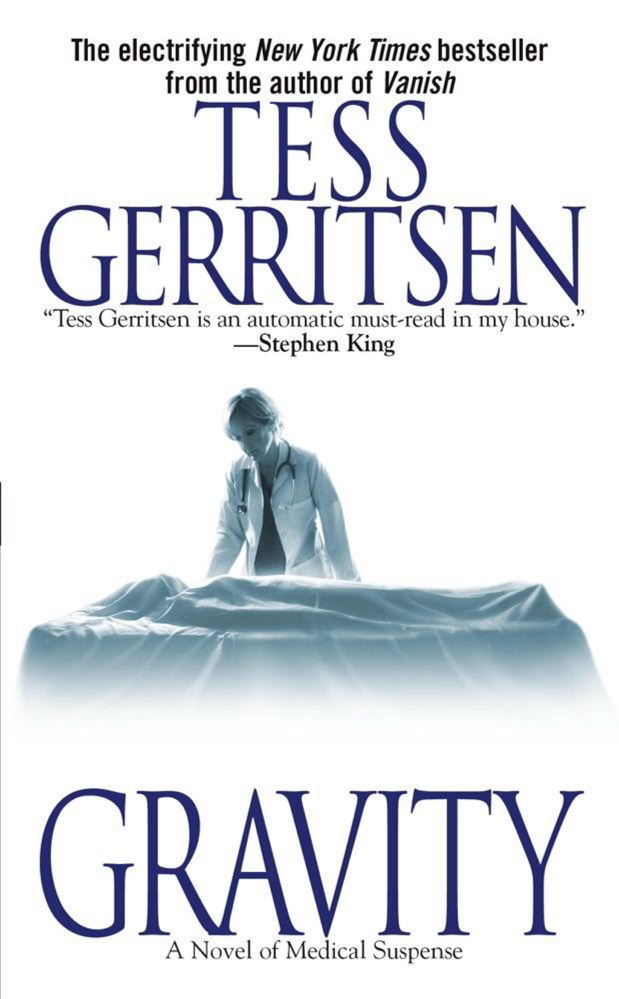Best-selling author Tess Gerritsen of Camden has sued Warner Bros., claiming she is owed more than $10 million for providing the story that became last year’s Oscar-winning film “Gravity.”
Many claims involving authors and movies allege that a production company has unlawfully used someone’s ideas or work, infringing on copyright, but Gerritsen’s case is about breach of contract. She claims that Warner Bros. owns the film rights to her 1999 novel “Gravity” but has not paid her according to the contract.
The lawsuit was filed Tuesday in U.S. District Court in California. Contacted by email Wednesday, Gerritsen said she could not comment on the lawsuit, although she was “dying” to talk about it.
Gerritsen, 60, who was a physician before she become a novelist, has lived in Maine for more than 20 years. She has written 24 novels, including the Rizzoli and Isles detective stories, which became the basis for a TV series on the TNT network. More than 25 million copies of her books have been sold.
“Gravity,” the movie starring Sandra Bullock and George Clooney, is about a medical engineer who, on her first mission in space, is set adrift when a cloud of satellite debris destroys the space shuttle on which she is working.
In Gerritsen’s book, physician and astronaut Emma Watson is stranded in a space station because of the spread of a deadly contagion.
Gerritsen’s lawsuit claims that Katja Motion Picture Corp., a division of New Line Productions, bought the movie rights to her book for $1 million. The agreement called for the film company to pay Gerritsen a $500,000 bonus if the movie was made, and 2.5 percent of the “net proceeds.”
Around 2002, New Line Productions abandoned plans to make the film, Gerritsen believed. New Line became a division of Warner Bros. in 2008, and production of the film “Gravity” began around 2011. The film has grossed an estimated $700 million so far.
Gerritsen initially thought the similarities between her novel and the film were a “coincidence,” says a statement on her website. But in February, she learned that “Gravity” director Alfonso Cuarón had been assigned to the development of her novel when it was first bought by New Line Productions.
“She’s not at all a litigious person, so she really didn’t start looking into this until she found out about this connection with the director,” said Gerritsen’s lawyer, Glen Kulik of Sherman Oaks, Calif. “She really didn’t start thinking about this at all until the movie came out and people sent her congratulations, or asked if she was going to do anything about the film being made from her book.”
A publicist for Warner Bros. said the studio would not comment, beyond noting that Gerritsen told a newspaper in Indiana in October that “Gravity” is “a great film, but it’s not based on my book.”
Gerritsen’s lawyers say that’s because she didn’t suspect the film was based on her book until February, when she learned about Cuarón’s connection.
The lawsuit also alleges that, after selling the rights to New Line Productions, Gerritsen wrote additional material for the production company, including scenes involving satellite debris colliding with the space station.
Kulik said Gerritsen doesn’t have to prove that her book is the exact model for the film, only that the film was based on her book.
“Warner Bros. owns the copyright, so we’re not disputing their right to make the movie. It’s just that we want them to follow the contract,” Kulik said. “It’s not a copyright infringement case, which is probably more common. It’s a breach of contract.”
In one of the few well-known breach-of-contract cases involving an author and a film company, the writer Art Buchwald won a $150,000 judgment in 1992 from Paramount when a judge ruled that the 1988 Eddie Murphy film “Coming to America” was based on a screen treatment that Buchwald wrote called “King for a Day.”
Buchwald optioned his treatment to Paramount, but it eventually canceled its plan to make a film based on it. The studio then went ahead with a film that had a very similar story.
The judge in the case determined that “Coming to America” was based on Buchwald’s story, specifically that it included “material elements” of the story or was “inspired” by it.
Copyright infringement cases usually involve a writer or author claiming an idea was stolen. That can be harder to prove, without documentation.
In 2007, a freelance journalist and film marketing professor named Reed Martin lost his copyright infringement case against independent director Jim Jarmusch over the film “Broken Flowers.” Martin’s main claim was that the film was based on a script he wrote, and that he had sent the script to various people who were in contact with Jarmusch.
Joshua Bodwell, executive director of the Maine Writers and Publishers Alliance, said he thinks Gerritsen’s lawyers made a “shrewd” decision by suing for breach-of-contract instead of copyright infringement.
A breach-of-contract suit presents as fact that the defendant owns the film rights to the story. In a copyright case, the defendant’s access to the original written material or idea must be proven.
“I haven’t heard of many cases that seem as legitimate as this one,” Bodwell said.
The case will likely take more than a year to resolve, if it goes to trial, Kulik said.
Although Gerritsen said she can’t talk about the case, she’ll continue to make appearances. She has several book signings or talks scheduled this summer in Maine, including in Boothbay Harbor, Bar Harbor, Prospect Harbor and Union.
Ray Routhier can be contacted at 791-6454 or at:
rrouthier@pressherald.com
Copy the Story LinkSend questions/comments to the editors.







Success. Please wait for the page to reload. If the page does not reload within 5 seconds, please refresh the page.
Enter your email and password to access comments.
Hi, to comment on stories you must . This profile is in addition to your subscription and website login.
Already have a commenting profile? .
Invalid username/password.
Please check your email to confirm and complete your registration.
Only subscribers are eligible to post comments. Please subscribe or login first for digital access. Here’s why.
Use the form below to reset your password. When you've submitted your account email, we will send an email with a reset code.